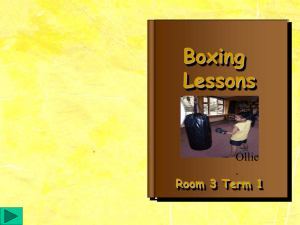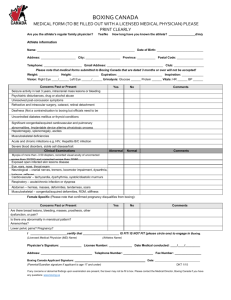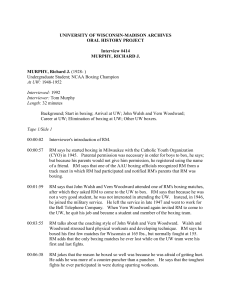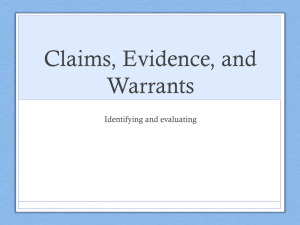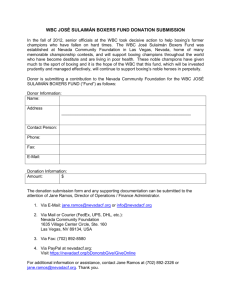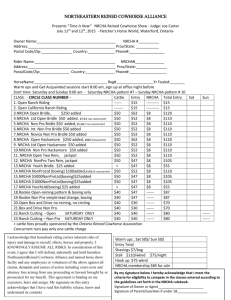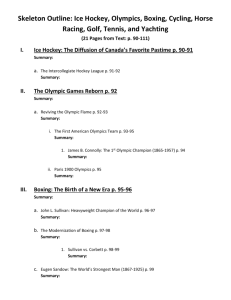House Report 104-833 Part 1 104 H. Rpt. 833
advertisement
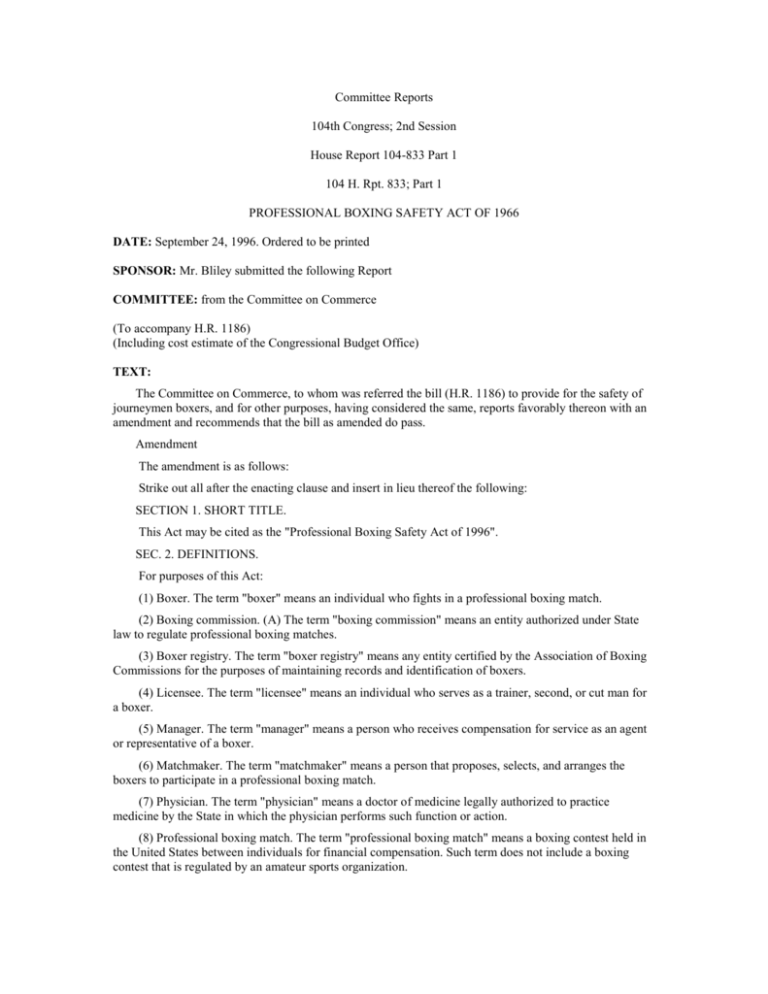
Committee Reports 104th Congress; 2nd Session House Report 104-833 Part 1 104 H. Rpt. 833; Part 1 PROFESSIONAL BOXING SAFETY ACT OF 1966 DATE: September 24, 1996. Ordered to be printed SPONSOR: Mr. Bliley submitted the following Report COMMITTEE: from the Committee on Commerce (To accompany H.R. 1186) (Including cost estimate of the Congressional Budget Office) TEXT: The Committee on Commerce, to whom was referred the bill (H.R. 1186) to provide for the safety of journeymen boxers, and for other purposes, having considered the same, reports favorably thereon with an amendment and recommends that the bill as amended do pass. Amendment The amendment is as follows: Strike out all after the enacting clause and insert in lieu thereof the following: SECTION 1. SHORT TITLE. This Act may be cited as the "Professional Boxing Safety Act of 1996". SEC. 2. DEFINITIONS. For purposes of this Act: (1) Boxer. The term "boxer" means an individual who fights in a professional boxing match. (2) Boxing commission. (A) The term "boxing commission" means an entity authorized under State law to regulate professional boxing matches. (3) Boxer registry. The term "boxer registry" means any entity certified by the Association of Boxing Commissions for the purposes of maintaining records and identification of boxers. (4) Licensee. The term "licensee" means an individual who serves as a trainer, second, or cut man for a boxer. (5) Manager. The term "manager" means a person who receives compensation for service as an agent or representative of a boxer. (6) Matchmaker. The term "matchmaker" means a person that proposes, selects, and arranges the boxers to participate in a professional boxing match. (7) Physician. The term "physician" means a doctor of medicine legally authorized to practice medicine by the State in which the physician performs such function or action. (8) Professional boxing match. The term "professional boxing match" means a boxing contest held in the United States between individuals for financial compensation. Such term does not include a boxing contest that is regulated by an amateur sports organization. (9) Promoter. The term "promoter" means the person primarily responsible for organizing, promoting, and producing a professional boxing match. (10) State. The term "State" means each of the 50 States, Puerto Rico, the District of Columbia, and any territory or possession of the United States. SEC. 3. PURPOSES. The purposes of this Act are (1) to improve and expand the system of safety precautions that protects the welfare of professional boxers; and (2) to assist State boxing commissions to provide proper oversight for the professional boxing industry in the United States. SEC. 4. BOXING MATCHES IN STATES WITHOUT BOXING COMMISSIONS. No person may arrange, promote, organize, produce, or fight in a professional boxing match held in a State that does not have a boxing commission unless the match is supervised by a boxing commission from another State and subject to the most recent version of the recommended regulatory guidelines certified and published by the Association of Boxing Commissions as well as any additional relevant professional boxing regulations and requirements of such other State. SEC. 5. SAFETY STANDARDS. No person may arrange, promote, organize, produce, or fight in a professional boxing match without meeting each of the following requirements or an alternative requirement in effect under regulations of a boxing commission that provides equivalent protection of the health and safety of boxers: (1) A physical examination of each boxer by a physician certifying whether or not the boxer is physically fit to safely compete, copies of which must be provided to the boxing commission. (2) Except as otherwise expressly provided under regulation of a boxing commission promulgated subsequent to the enactment of this Act, an ambulance or medical personnel with appropriate resuscitation equipment continuously present on site. (3) A physician continuously present at ringside. (4) Health insurance for each boxer to provide medical coverage for any injuries sustained in the match. SEC. 6. REGISTRATION. (a) Requirements. Each boxer shall register with (1) the boxing commission of the State in which such boxer resides; or (2) in the case of a boxer who is a resident of a foreign country, or a State in which there is no boxing commission, the boxing commission of any State that has such a commission. (b) Identification Card. (1) Issuance. A boxing commission shall issue to each professional boxer who registers in accordance with subsection (a), an identification card that contains each of the following: (A) A recent photograph of the boxer. (B) The social security number of the boxer (or, in the case of a foreign boxer, any similar citizen identification number or professional boxer number from the country of residence of the boxer). (C) A personal identification number assigned to the boxer by a boxing registry. (2) Renewal. Each professional boxer shall renew his or her identification card at least once every 2 years. (3) Presentation. Each professional boxer shall present his or her identification card to the appropriate boxing commission not later than the time of the weigh-in for a professional boxing match. SEC. 7. REVIEW. (a) Procedures. Each boxing commission shall establish each of the following procedures: (1) Procedures to evaluate the professional records and physicians certification of each boxer participating in a professional boxing match in the State, and to deny authorization for a boxer to fight where appropriate. (2) Procedures to ensure that, except as provided in subsection (b), no boxer is permitted to box while under suspension from any boxing commission due to (A) a recent knockout or series of consecutive losses; (B) an injury, requirement for a medical procedure, or physician denial of certification; (C) failure of a drug test; or (D) the use of false aliases, or falsifying, or attempting to falsify, official identification cards or documents. (3) Procedures to review a suspension where appealed by a boxer, including an opportunity for a boxer to present contradictory evidence. (4) Procedures to revoke a suspension where a boxer (A) was suspended under subparagraph (A) or (B) of paragraph (2) of this subsection, and has furnished further proof of a sufficiently improved medical or physical condition; or (B) furnishes proof under subparagraph (C) or (D) of paragraph (2) that a suspension was not, or is no longer, merited by the facts. (b) Suspension in Another State. A boxing commission may allow a boxer who is under suspension in any State to participate in a professional boxing match (1) for any reason other than those listed in subsection (a) if such commission notifies in writing and consults with the designated official of the suspending States boxing commission prior to the grant of approval for such individual to participate in that professional boxing match; or (2) if the boxer appeals to the Association of Boxing Commissions, and the Association of Boxing Commissions determines that the suspension of such boxer was without sufficient grounds, for an improper purpose, or not related to the health and safety of the boxer or the purposes of this Act. SEC. 8. REPORTING. Not later than 48 business hours after the conclusion of a professional boxing match, the supervising boxing commission shall report the results of such boxing match and any related suspensions to each boxer registry. SEC. 9. CONFLICTS OF INTEREST. No member or employee of a boxing commission, no person who administers or enforces State boxing laws, and no member of the Association of Boxing Commissions may belong to, contract with, or receive any compensation from, any person who sanctions, arranges, or promotes professional boxing matches or who otherwise has a financial interest in an active boxer currently registered with a boxer registry. For purposes of this section, the term "compensation" does not include funds held in escrow for payment to another person in connection with a professional boxing match. The prohibition set forth in this section shall not apply to any contract entered into, or any reasonable compensation received, by a boxing commission to supervise a professional boxing match in another State as described in section 4. SEC. 10. ENFORCEMENT. (a) Injunctions. Whenever the Attorney General of the United States has reasonable cause to believe that a person is engaged in a violation of this Act, the Attorney General may bring a civil action in the appropriate district court of the United States requesting such relief, including a permanent or temporary injunction, restraining order, or other order, against the person, as the Attorney General determines to be necessary to restrain the person from continuing to engage in, sanction, promote, or otherwise participate in a professional boxing match in violation of this Act. (b) Criminal Penalties. (1) Managers, promoters, matchmakers, and licensees. Any manager, promoter, matchmaker, and licensee who knowingly violates or knowingly coerces or causes any other person to violate, any provision of this Act shall, upon conviction, be imprisoned for not more than 1 year or fined not more than $20,000, or both. (2) Conflict of interest. Any member or employee of a boxing commission, any person who administers or enforces State boxing laws, and any member of the Association of Boxing Commissions who knowingly violates section 9 of this Act shall, upon conviction, be imprisoned for not more than 1 year or fined not more than $20,000, or both. (3) Boxers. Any boxer who knowingly violates any provision of this Act shall, upon conviction, be fined not more than $1,000. SEC. 11. NOTIFICATION OF SUPERVISING BOXING COMMISSION. Each promoter who intends to hold a professional boxing match in a State that does not have a boxing commission shall, not later than 14 days before the intended date of that match, provide written notification to the supervising boxing commission designated under section 4. Such notification shall contain each of the following: (1) Assurances that, with respect to that professional boxing match, all applicable requirements of this Act will be met. (2) The name of any person who, at the time of the submission of the notification (A) is under suspension from a boxing commission; and (B) will be involved in organizing or participating in the event. (3) For any individual listed under paragraph (2), the identity of the boxing commission that issued the suspension described in paragraph (2)(A). SEC. 12. STUDIES. (a) Pension. The Secretary of Labor shall conduct a study on the feasibility and cost of a national pension system for boxers, including potential funding sources. (b) Health, Safety and Equipment. The Secretary of Health and Human Services shall conduct a study to develop recommendations for health, safety, and equipment standards for boxers and for professional boxing matches. (c) Reports. Not later than one year after the date of enactment of this Act, the Secretary of Labor shall submit a report to the Congress on the findings of the study conducted pursuant to subsection (a). Not later than 180 days after the date of enactment of this Act, the Secretary of Health and Human Services shall submit a report to the Congress on the findings of the study conducted pursuant to subsection (b). SEC. 13. PROFESSIONAL BOXING MATCHES CONDUCTED ON INDIAN RESERVATIONS. (a) Definitions. For purposes of this section, the following definitions shall apply: (1) Indian tribe. The term "Indian tribe" has the same meaning as in section 4(e) of the Indian SelfDetermination and Education Assistance Act (25 U.S.C. 450b(e)). (2) Reservation. The term "reservation" means the geographically defined area over which a tribal organization exercises governmental jurisdiction. (3) Tribal organization. The term "tribal organization" has the same meaning as in section 4(l) of the Indian Self-Determination and Education Assistance Act (25 U.S.C. 450b(l)). (b) Requirements. (1) In general. Notwithstanding any other provision of law, a tribal organization of an Indian tribe may, upon the initiative of the tribal organization (A) regulate professional boxing matches held within the reservation under the jurisdiction of that tribal organization; and (B) carry out that regulation or enter into a contract with a boxing commission to carry out that regulation. (2) Standards and licensing. If a tribal organization regulates professional boxing matches pursuant to paragraph (1), the tribal organization shall, by tribal ordinance or resolution, establish and provide for the implementation of health and safety standards, licensing requirements, and other requirements relating to the conduct of professional boxing matches that are at least as restrictive as (A) the otherwise applicable standards and requirements of a State in which the reservation is located; or (B) the most recent version of the recommended regulatory guidelines published and certified by the Association of Boxing Commissions. SEC. 14. RELATIONSHIP WITH STATE LAW. Nothing in this Act shall prohibit a State from adopting or enforcing supplemental or more stringent laws or regulations not inconsistent with this Act, or criminal, civil, or administrative fines for violations of such laws or regulations. SEC. 15. EFFECTIVE DATE. The provisions of this Act shall take effect on January 1, 1997, except as follows: (1) Section 9 shall not apply to an otherwise authorized boxing commission in the Commonwealth of Virginia until July 1, 1998. (2) Sections 5 through 9 shall take effect on July 1, 1997. Purpose and Summary H.R. 1186, as reported, is intended to improve the ability of State-authorized boxing commissions to provide proper oversight of professional boxing, and to establish minimum health and safety standards for professional boxers. It ensures that no professional boxing match may be conducted without the supervision of a State-authorized boxing commission. It creates a uniform system of registration, licensing, and reporting, which is regulated and managed by States and private interests. Procedures are outlined for mutual recognition, review, and appeal of boxer suspensions. Minimum safety standards are established with the manner and extent of such standards left up to the States, including a pre-fight physical exam by a licensed physician, a physician and an ambulance or medical personnel with appropriate resuscitation equipment continuously present at ringside, and health insurance for each boxer to provide medical coverage for injuries sustained during a match. Members and employees of boxing commissions and the Association of Boxing Commissions are prohibited from belonging to, contracting with, or receiving compensation from those who sanction, arrange, or promote professional boxing matches or who have a financial interest in a boxer. Two studies are authorized, one by the Secretary of Labor to determine the feasibility of a national pension system for boxers; the second by the Department of Health and Human Services (National Institute for Occupational Safety and Health) to develop recommendations for health, safety, and equipment standards for boxing. The Attorney General is empowered to enforce this legislation, and States are authorized to adopt additional regulations and penalties that are not inconsistent with these purposes. Background and Need for Legislation Boxing is perhaps the oldest sport in existence, dating back to the Sumerians in 2600 BC. The ancient Greeks introduced boxing to the Olympics in 688 BC, with participants required to wear protective headgear and leather hand-coverings. The sport became more violent under the Romans, with slaves forced to fight for their freedom wearing only iron-studded gloves. Organized individual fighting has since been reintroduced and outlawed over the years, with modern boxing rules first introduced in England and the United States in the late nineteenth century. Unlike many modern sports, professional boxing has no single set of health and safety standards for its athletes. Matches are organized by an uncoordinated group of private sanctioning bodies and promoters who are only minimally concerned with the rights and safety of individual boxers. Boxing commissions do not even exist in a handful of States, and many existing commissions are undermanned, underfunded, and fail to provide such minimum safety precautions as evaluating a boxers record for suspensions or ensuring health insurance coverage for injuries sustained by a boxer during a match. Issues of fraud also continue to haunt the sport. Boxing titles are handed out by an "alphabet soup" of sanctioning bodies. Numerous witnesses have testified before the Committee that fighters are not matched on the basis of merit, but rather according to the interests of certain key promoters with significant conflicts of interests. Legitimate title contenders find themselves shut out of championship competition if they dont pay their dues and play the game accordingly. Many fighters are intentionally mismatched in order to massage the win-loss record of favored individuals. These mismatches can result in a greatly increased risk of injury, especially when conducted with inadequate medical examinations and supervision. For example, the Committee examined the records of three boxers who together have lost hundreds of professional fights, receiving numerous consecutive suspensions which were subsequently ignored as they journeyed from State to State in search of the next fall to the canvass. Unfortunately, these poorly-supervised matches result in numerous long-term injuries, including chronic brain injuries. Hearings Since 1983, the Committee on Commerce has held seven hearings on the sport of boxing, receiving testimony on issues of fraud and the dangers to boxer health and safety. H.R. 1186 marks the third time that the Committee on Commerce has reported legislation to the full House. The Committee on Economic and Educational Opportunities has held an additional four hearings during this period, twice reporting boxing legislation. During the 104th Congress, the Subcommittee on Commerce, Trade, and Hazardous Materials held a joint hearing on H.R. 1186, the Professional Boxing Safety Act of 1996, with the Committee on Economic and Educational Opportunities Subcommittee on Workforce Protections, on June 11, 1996. Testimony was received from the following witnesses: the Honorable Pat Williams; the Honorable Major R. Owens; the Honorable John McCain; the Honorable Richard H. Bryan; the Honorable Bill Richardson; Mr. Marc Ratner, President of the Association of Boxing Commissions and Executive Director of the Nevada State Athletic Commission; Mr. Gregory P. Sirb, Vice President of the Association of Boxing Commissions and Executive Director of the Pennsylvania State Athletic Commission; Mr. David Dick, Director, Virginia State Department of Professional and Occupational Regulation; Mr. Bruce Anderson, Director, Boxing and Wrestling Commission Section of the Oregon State Police; Mr. Tim Witherspoon, professional boxer; Mr. Tony Thornton, professional boxer; and Dr. Charles Wilson, M.D., Atlantic City, New Jersey. Committee Consideration On July 18, 1996, the Subcommittee on Commerce, Trade, and Hazardous Materials met in open markup session and approved H.R. 1186, the Professional Boxing Safety Act of 1996, for Full Committee consideration, as amended, by a rollcall vote of 11 yeas to 10 nays. On September 18, 1996, the Committee on Commerce met in open markup session and ordered H.R. 1186 reported to the House, as amended, by a voice vote, a quorum being present. Rollcall Votes Clause 2(l)(2)(B) of rule XI of the Rules of the House of Representatives requires the Committee to list the recorded votes to report legislation and on amendments thereto. There were no recorded votes taken in connection with ordering H.R. 1186 reported or in adopting the amendment. The voice votes taken in Committee are as follows: Committee on Commerce, 104th Congress, Voice Votes (September 18, 1996) Bill: H.R. 1186, Professional Boxing Safety Act of 1996. Amendment: Amendment in the Nature of a Substitute offered by Mr. Oxley. Disposition: Agreed to, by a voice vote. Motion: Motion by Mr. Moorhead to order H.R. 1186 reported to the House, as amended. Disposition: Agreed to, by a voice vote. Committee Oversight Findings Pursuant to clause 2(l)(3)(A) of rule XI of the Rules of the House of Representatives, the Subcommittee on Commerce, Trade, and Hazardous Materials held a legislative hearing and made findings that are reflected in this report. Committee on Government Reform and Oversight Pursuant to clause 2(l)(3)(D) of rule XI of the Rules of the House of Representatives, no oversight findings have been submitted to the Committee by the Committee on Government Reform and Oversight. New Budget Authority and Tax Expenditures In compliance with clause 2(l)(3)(B) of rule XI of the Rules of the House of Representatives, the Committee states that H.R 1186 would result in no new or increased budget authority or tax expenditures or revenues. Committee Cost Estimate The Committee adopts as its own the cost estimate prepared by the Director of the Congressional Budget Office pursuant to section 403 of the Congressional Budget Act of 1974. Congressional Budget Office Estimate Pursuant to clause 2(l)(3)(C) of rule XI of the Rules of the House of Representatives, the following is the cost estimate provided by the Congressional Budget Office pursuant to section 403 of the Congressional Budget Act of 1974: U.S. Congress, Congressional Budget Office, Washington, DC, September 24, 1996. Hon. Thomas J. Bliley, Jr., Chairman, Committee on Commerce, House of Representatives, Washington, DC. Dear Mr. Chairman: The Congressional Budget Office has prepared the enclosed cost estimate for H.R. 1186, the Professional Boxing Safety Act of 1996. Enacting H.R. 1186 would affect direct spending and receipts. Therefore, pay-as-you-go procedures would apply to the bill. If you wish further details on this estimate, we will be pleased to provide them. Sincerely, June E. ONeill, Director. CONGRESSIONAL BUDGET OFFICE COST ESTIMATE 1. Bill number: H.R. 1186. 2. Bill title: Professional Boxing Safety Act of 1996. 3. Bill status: As ordered reported by the House Committee on Commerce on September 18, 1996. 4. Bill purpose: H.R. 1186 would permit a professional boxing match to take place only if the match conformed to conditions outlined in the bill. Matches could only be held in a state with a boxing commission or under the supervision of a state with a boxing commission. The bill would impose various health and safety standards, including a requirement that a physician certify the boxers in a match to be physically fit. Each boxer would need to present an identification card issued by a state boxing commission before the start of the match. H.R. 1186 would require state boxing commissions to establish procedures for evaluating the professional records of boxers and ensuring that no boxer is permitted to box while under suspension from any other state boxing commission. The bill would direct Indian tribes to establish standards for boxing matches on Indian reservations Tribes also could opt to contract with a state boxing commission to oversee matches held on its reservation. The bill also would establish standards to prevent conflicts of interest between the organizers and promoters of a match and those who monitor the industry. The bill would permit United States Attorneys to bring civil actions against anyone who violates provisions of the bill and would establish criminal fines and penalties for violations. Finally, the bill would require the Secretary of Labor to conduct a study on a national pension plan for professional boxers and the Secretary of Health and Human Services to develop recommendations for health, safety, and equipment standards for boxers and boxing matches. 5. Estimated cost to the Federal Government: CBO estimates that enacting H.R. 1186 would have no significant impact on the federal budget. Based on information from the Office of the United States Attorneys, CBO estimates that the bill would not result in any significant cost to the federal government for additional civil actions brought by United States. Based on information from the Department of Justice we estimate that any increase in collections for criminal fines would not be significant. Criminal fines would be deposited in the Crime Victims Fund and spent in the following year as direct spending. The increase in direct spending would be the same as the amount of fines collected, with a oneyear lag. Therefore, additional direct spending would also be negligible. Based on information from the Department of Labor and the Department of Health and Human Service, we estimate that the studies required by H.R. 1186 would cost about $500,000, assuming appropriation of the necessary funds. 6. Pay-as-you-go considerations: Section 252 of the Balanced Budget and Emergency Deficit Control Act of 1985 sets up pay-as-you-go procedures for legislation affecting direct spending or receipts through 1998. Enacting H.R. 1186 would affect direct spending and receipts through the imposition of criminal fines and the resulting spending from the Crime Victims Fund. However, CBO estimates that the amounts involved would not be significant. The following table summarizes the estimated pay-as-you-go impact of this bill. -- (PLEASE REFER TO ORIGINAL SOURCE FOR TABLE) -7. Estimated impact on State, local, and tribal governments: H.R. 1186 would impose intergovernmental mandates as defined in the Unfunded Mandates Reform Act of 1995 (Public Law 1044), but CBO estimates that the cost of these mandates would not be significant and would not exceed the $50 million threshold established in the law. The bill would place requirements on states that have boxing commissions and on Indian tribes that hold boxing matches on their reservations. State boxing commissions would be required to issue identification cards to each professional boxer who registers with the commission. They would also be required to establish various procedures and to file reports with each boxer registry certified by the Association of Boxing Commissions. Although the bill establishes these requirements for the 45 existing commissions, it does not require states to establish such commissions. Boxers residing in a state with no boxing commission could register with any other states commission. Promoters seeking to put on a boxing match in a state that does not have a boxing commission could enter into an agreement with another states commission to oversee the match. Consequently, states without boxing commissions would not be required to create them to comply with this bill. According to several state boxing officials, many commissions are already complying with the requirements set out in the bill. CBO estimates that the costs to state commissions not already in compliance would thus be minimal. The bill would also require Indian tribes, if they chose to regulate professional boxing matches held on their reservation, to have in place health and safety standards and other requirements that are at least as restrictive as either the standards of the states in which the reservations are located or the guidelines of the Association of Boxing Commissions. Instead of meeting this requirement, tribes could opt to contract with a state boxing commission to oversee matches. Industry data indicates that about 25 professional boxing matches have been held annually on reservations in recent years, and that the cost of contracting for supervision from a state boxing commission ranges from $500 to $1,500 per match. Assuming that tribes would incur similar costs whether they contract out or oversee the matches themselves, CBO estimates that the costs of the mandate on tribes would not exceed $40,000 per year. Even if the number of matches held on reservations increases dramatically in the future, total compliance costs would not be significant. 8. Estimated impact on the private sector: H.R. 1186 would impose mandates on the promoters of professional boxing matches and on boxers. CBO estimates that the cost of those mandates would be well below the $100 million threshold. This bill would require that a promoter of a professional boxing match in a state without a boxing commission arrange to have the match supervised by a boxing commission from another state. Further, the promoter must provide written assurances to the supervising boxing commission that they have complied with the provisions of this act. Based on industry data, in recent years the number of unsupervised matches in the five states that do not have boxing commissions ranges from one to three annually. The total costs of supervision range from $500 to $1,500 per match. Thus CBO estimates this provision would impose costs of between $500 and $4,500 a year on the private sector. H.R. 1186 would require promoters of a boxing match to meet various health and safety standards in order to hold a boxing match. According to representatives of the boxing industry, some of those standards are now being met either on a mandatory or voluntary basis. At most, those new requirements would affect approximately 80 matches annually and about 700 boxers. The maximum private-sector costs associated with these safety standards would amount to approximately $100,000 a year. CBO expects that some states would exclude some requirements by subsequent regulation as allowed under section 5(2), thus reducing the required costs. Based on information from the Association of Boxing Commissions, CBO estimates that each boxer would be expected to pay approximately $15 for a renewable identification card as required by the bill. Data from the industry indicates that there are approximately 3,000 active boxers in the United States. Thus, the cost of this provision is estimated to be about $45,000. 9. Previous CBO estimate: On August 1, 1995, CBO provided a cost estimate for S. 187, the Professional Boxing Safety Act, as ordered reported by the Senate Committee on Commerce, Science, and Transportation on July 20, 1995. The two bills are similar; however, H.R. 1186 would require an additional study by the Department of Health and Human Services. CBO estimates that both bills would not result in any significant impact on the federal budget. 10. Estimate prepared by: Federal cost estimate: Rachel Forward and Stephanie Weiner. Impact on State, local, and tribal governments: Pepper Santalucia. Impact on the private sector: Jean Wooster. 11. Estimate approved by: Paul N. Van de Water, Assistant Director for Budget Analysis Inflationary Impact Statement Pursuant to clause 2(l)(4) of rule XI of the Rules of the House of Representatives, the Committee finds that the bill would have no inflationary impact. Advisory Committee Statement No advisory committees within the meaning of section 5(b) of the Federal Advisory Committee Act are created by this legislation. Section-by-Section Analysis of the Legislation Section 1. Short title Section 1 sets forth the title of the Act as the "Professional Boxing Safety Act of 1996". Section 2. Definitions Section 2 sets forth the definitions used in the Act. The Committee intends that "boxing commissions" can be any entity, private or public, that is authorized under State law to regulate professional boxing, so long as such entity does not violate the conflict of interest provisions in Section 9 of this Act. "Boxer registries" are intended by the Committee to be the data banks for receiving and distributing information on the current status of licensed boxers. The Florida State Athletic Commission is currently receiving and distributing free updates on all suspended boxers in the United States. The Association of Boxing Commissions currently retains Fight Fax, Inc. as its record keeper. The Committee intends that the Association of State Boxing Commissions may designate any reasonable number of appropriate entities which can receive and distribute, for a fee or free-of-charge, the information required to be reported under Section 8. The Committee recognizes that the definition of "physician" may encompass authorized doctors with practice specialties unrelated to typical boxing injuries, and expects that States shall further qualify and refine what types of physicians are most effective at ringside. "Professional boxing matches" involve two unarmed individuals physically striking each other with gloved fists with intent to cause harm as a sport for the purpose of receiving financial compensation. Professional boxing is not intended to include amateur competitions which are governed by USA Boxing, such as Olympic boxing, collegiate boxing, police athletic leagues, Golden Gloves, Silver Gloves, Local Boxing Committees, and other forms of local competitions which may involve nominal stipends for living and training expenses for members, but not cash prizes for individual competitions. The term "promoter" is not intended to include entities such as resorts that may participate to a minor extent in advertising the match, or other owners or operators of a venue where a match is taking place, where such entities are not primarily responsible for promoting the particular match in question. Section 3. Purposes The purposes of the Act are to improve professional boxing safety standards and to assist States and their boxing commissions in providing appropriate regulatory oversight of professional boxing. Section 4. Boxing matches in States without boxing commissions States are not required to establish or authorize boxing commissions. A professional boxing match may be held in a State without a boxing commission, but only if such match is supervised by a boxing commission authorized in another State. The match is then subject to the requirements both of the State of the supervising commission and the most recent version of the recommended regulatory guidelines certified and published by the Association of Boxing Commissions. It is anticipated that the Association of Boxing Commissions shall certify and publish a set of such guidelines before the July 1, 1997, effective date of Sections 5-9 of this Act, and that such guidelines shall be periodically updated as appropriate. Section 5. Safety standards There are four safety standards required before a professional boxing match may take place: (1) each boxer must obtain a physical examination by a physician certifying that the boxer is physically fit to compete safely, with copies of the certification provided to the boxing commission; (2) an ambulance or medical personnel with appropriate resuscitation equipment must be continuously present on site; (3) a physician must be present continuously at ringside; and (4) health insurance must be provided for each boxer to cover injuries sustained during a match. Boxing commissions are given full latitude as to the manner in which the standards are to be carried out, and may adopt alternative requirements that provide equivalent protection of boxers health and safety. For example, different boxing commissions may develop different requirements as to which persons involved in a match are responsible for making any payments necessary to ensure that the standards are met. While each boxing commission is responsible for developing regulations to implement these standards for boxing matches under its supervision, all four requirements must be met for a match to occur. Any individual who participates in the match, whether as a promoter, matchmaker, or boxer, who knows that one of these standards is not being met is subject to criminal penalties as set forth in Section 10. With respect to the first standard, the Committee expects that boxing commissions and the Association of Boxing Commissions shall require that such examination take place within a certain short time period before the match, as each entity considers appropriate. With respect to the second standard (ambulance/medical personnel), boxing commissions may adopt different regulations if expressly promulgated subsequent to the enactment of this Act, as appropriate to adapt to the needs and abilities of local venues. In essence, it is the intent of the Committee that the second standard be a default minimum requirement, adaptable to future needs of local communities as expressly determined by each commission. With respect to the fourth requirement, the Committee recognizes that many boxing commissions currently do not require health insurance to be provided to boxers in their jurisdictions. Boxing by necessity involves serious risk of injury, both in training and during a match. To ensure the long term health and safety of boxers, as well as to reduce the burdens placed on Federal health care programs as a result of inadequate health care coverage for boxers, each boxing commission is effectively required to determine the appropriate type and amounts of health insurance that should be provided to boxers who fight under its supervision. Section 6. Registration Each boxer must register in the State in which he or she is a legal resident. If a boxer is a legal resident of a foreign country or a State which does not have an authorized boxing commission, then he or she can register in any State with an authorized boxing commission. Upon registration, the boxing commission shall issue to the boxer an identification card that contains: (A) a recent photograph of the boxer; (B) the boxers social security number (or any similar identification number for foreign boxers), and (C) a personal identification number assigned to the boxer by a boxing registry (which may be the same as the boxers social security number). Each boxer is responsible for renewing the identification card at least once every two years, or more frequently as required by the boxing commission in the State where the boxer resides. The boxer must present his or her identification card before a match to the supervising boxing commission, no later than the time of the weigh-in. Section 7. Review Each boxing commission must establish procedures to evaluate the professional records of each boxer (as obtained through a boxing registry) before a match, as well as the physicians certification that a boxer is physically fit to compete (as provided under Section 5(a)(1) of this Act). A boxing commission shall be able to deny authorization for a boxer to fight, based solely on such evaluation. A boxing commission must deny a boxer the authority to fight if such boxer is under suspension from any boxing commission due to: (A) a recent knockout or series of consecutive losses; (B) an injury, requirement for a medical procedure, or physician denial of certification; (C) failure of a drug test; or (D) the use of false aliases, or falsifying, or attempting to falsify, official identification cards or documents. Each boxing commission must further adopt procedures to allow a boxer to appeal a suspension ordered by such commission. The appeal shall include, at a minimum, the right of a boxer to present contradictory evidence. The suspension must be revoked by the boxing commission if the boxer provides proof of a sufficiently improved medical or physical condition (where the suspension was based on reasons (A) or (B) above), or that such suspension was not, or is no longer, merited by the facts. The Committee expects each boxing commission to set forth in its procedures the process and standards for review and to make such procedures publicly available. The Association of Boxing Commissions has agreed to publish guidelines for commission review procedures, as well as establishing its own suspension review system for appeals by boxers wishing to fight in States in which they have not yet been suspended. Subsection (b) allows a boxing commission to authorize a boxer to fight despite a suspension by another boxing commission, but only under limited circumstances. If the boxer is suspended for any of the reasons listed above (paragraphs A-D of Section 7(a)(2)), then such reprieve may only be granted if the boxer successfully appeals to the Association of Boxing Commissions. The Association of Boxing Commissions may grant such appeal if it determines that the suspension was without sufficient grounds, for an improper purpose, or not related to the health and safety of the boxer or the purposes of this Act. This provision is intended to prevent a corrupt or careless commission from destroying the professional career of a boxer by allowing the boxer to make an out-of-State appeal to be able to fight outside the State of the suspending commission. Subsection (b) further allows a boxing commission to authorize a boxer to fight despite a suspension by another boxing commission for reasons other than those listed in paragraphs A-D of Section 7(a)(2), if the commission consults with and provides written notification to the suspending boxing commission. This provision is intended to address situations unrelated to a boxers health or safety, such as (but not limited to) suspensions for failure to pay certain administrative or other fees or fines. The consultation and written notification provide a minimum level of investigation necessary for a boxing commission to determine the exact nature of the suspension, while allowing each commission to determine whether the offense is sufficiently grave to automatically disqualify the boxer from fighting in that State. Section 8. Reporting A boxing commission must report the results of each match that it supervises, including any related suspensions, within 48 hours, not including weekends and holidays, to each boxer registry (as certified by the Association of Boxing Commissions). Section 9. Conflicts of interest Boxing commission members and employees, and members of the Association of Boxing Commissions, and any other persons who administer or enforce State boxing laws, may not be formally associated with or contracted to receive compensation from boxing promoters, managers, sanctioning bodies, or other persons with a financial interest in any active boxer. The Committee recognizes that many current commissioners and commission employees are fully involved in all aspects of boxing, both for personal interest and as a profit-making activity. While most of these individuals are honest and benefit their commissions with continued hands-on expertise in the sport, the Committee believes that a bright-line prohibition is necessary to begin to curb the numerous conflicts of interest that are severely corrupting the sport of boxing. The provision excepts from the conflict of interest test, however, funds held in escrow for payment to another person in connection with a match. For example, promoters of a match are often required to deposit payments for referees, judges, ringside physicians and other individuals involved in a match directly with the supervising commission. The commission holds these funds until the completion of the match, at which time it distributes the payments to the various officials. The provision also excepts contracts and reasonable compensation received by a boxing commission to supervise an out-of-State match, as described in Section 4. Section 10. Enforcement The Attorney General of the United States is authorized to bring a civil action in the appropriate district court of the United States where the Attorney General has reason to believe that a person is engaged in a violation of this Act. The relief requested shall be as the Attorney General determines to be necessary to prevent the continued violation of this Act, including a temporary or permanent injunction or restraining order. The Attorney General may also bring criminal charges against a manager, promoter, matchmaker, or licensee who knowingly violates, or coerces or causes any other person to violate, the provisions of this Act. Charges may also be brought against any member or employee of a boxing commission or the Association of Boxing Commissions who knowingly violates the conflict of interest provisions (Section 9) of this Act. The penalties for conviction of such offenses shall be imprisonment for not more than 1 year, or fines of not more than $20,000. The Attorney General may also charge an individual who violates this Act in his or her capacity as a boxer with penalties upon conviction of fines not to exceed $1,000. Section 11. Notification of supervising boxing commission A promoter who intends to hold a boxing match in a State without an authorized boxing commission must contract with an authorized boxing commission from another State (as set forth in Section 4) to supervise the match. The promoter must provide written notification to such commission, at least 14 days before the match, of the names of any person involved in the match that are under suspension from any boxing commission (and the identity of such commissions), as well as providing assurances that all applicable requirements of this Act will be met with respect to the match. Section 12. Studies Two studies are authorized to provide future guidance for improving the long-term health and safety of boxers. The first study directs the Secretary of Labor to determine the feasibility and cost of creating a national pension system for boxers, including identification of potential funding sources. The second study shall develop recommendations for health, safety, and equipment standards for the sport of boxing and shall be performed by the Department of Health and Human Services, presumably within the National Institute for Occupational Safety and Health. Section 13. Professional boxing matches conducted on Indian reservations Tribal organizations of American Indian tribes may authorize a boxing match to be held within their territory, and may chose to either supervise the match directly, or enter into a contract with an authorized boxing commission of any State to supervise a match. The tribal organization is then responsible for implementing health and safety standards, licensing requirements, and other requirements as set forth in Sections 5-9 of this Act that are at least as restrictive as either the otherwise applicable standards and requirements of a State in which the reservation is located, if such State has an authorized boxing commission, or of the most recent regulations published and certified by the Association of Boxing Commissions. Section 14. Relationship with State law This provision allows States to adopt supplemental or more stringent regulations that are not inconsistent with this Act. It further clarifies that States may authorize additional criminal, civil, and administrative fines for violations of this Act or other local regulations. Section 15. Effective date Section 9 on conflicts of interest shall not apply to the Commonwealth of Virginia until after the contract of the current boxing commission expires on July 1, 1998. Sections 5 through 9 of the Act shall otherwise take effect on July 1, 1997. The remaining sections shall become effective January 1, 1997. Changes in Existing Law Made by the Bill, as Reported This legislation does not amend any existing Federal statute.
